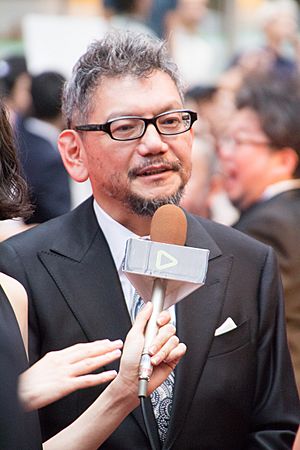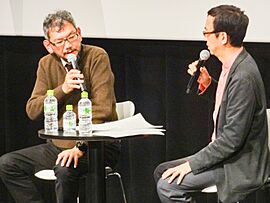Hideaki Anno facts for kids
Quick facts for kids
Hideaki Anno
|
|
|---|---|
| 庵野秀明 | |

Anno at the premiere of Shin Godzilla in July 2016
|
|
| Born | May 22, 1960 Ube, Yamaguchi, Japan
|
| Nationality | Japanese |
| Occupation |
|
| Years active | 1981–present |
|
Notable work
|
|
| Spouse(s) |
Moyoko Anno
(m. 2002) |
| Signature | |
 |
|
Hideaki Anno (Japanese: 庵野 秀明, Hepburn: Anno Hideaki, born May 22, 1960) is a famous Japanese anime creator, director, and actor. He is best known for creating the Evangelion series, which became a huge hit and changed the world of anime. Anno is known for his unique style that often shows what characters are thinking and feeling deep inside.
Some of his other famous works include Gunbuster (1988), Nadia: The Secret of Blue Water (1990), and Kare Kano (1998). He also directed a series of live-action movies that rebooted classic Japanese characters, including Shin Godzilla (2016), Shin Ultraman (2022), and Shin Kamen Rider (2023). Many of his anime have won major awards in Japan.
Contents
Life and Career
Early Life and First Job
Hideaki Anno was born in Ube, a city in the Yamaguchi area of Japan. Even as a kid, he loved art and making short movies for school festivals.
He went to the Osaka University of Arts to study art. While he was a student, he started working as an animator on the popular anime series The Super Dimension Fortress Macross. He got so busy making his own films with friends that he was eventually expelled from the university for not paying his tuition.
His big break came when he worked on the famous 1984 movie Nausicaä of the Valley of the Wind by director Hayao Miyazaki. The movie studio was looking for more animators, so Anno showed his drawings to Miyazaki. Miyazaki was so impressed that he hired Anno to draw some of the most difficult scenes in the movie.
Founding Gainax Studio
In 1984, Anno helped start the animation studio Gainax. He directed some of the studio's most important early projects, like Gunbuster and Nadia: The Secret of Blue Water.
However, after finishing Nadia, Anno went through a very difficult and sad period in his life that lasted for four years. He didn't have much creative control over the series, which was based on an idea from Hayao Miyazaki. This experience would later influence his most famous work.
Creating Neon Genesis Evangelion
In 1995, Anno began working on the anime series Neon Genesis Evangelion. The story is set in a future Tokyo after a disaster and follows teenagers who pilot giant robots to fight monsters called Angels.
Anno used his own experiences with sadness to explore the feelings of the characters. This made the show very deep and focused on psychology. As the series went on, it became less about giant robot fights and more about what was going on inside the characters' minds.
The final two episodes were very abstract and different from a normal story. Anno wanted to show young people the real struggles of life. At first, the show wasn't a huge hit, but it became very popular when it was moved to a later time slot.
Because of a tight schedule, the original ending had to be changed. In 1997, Anno and Gainax released the movie The End of Evangelion, which served as a new finale for the series.
Work After Evangelion
After Evangelion, Anno directed the 1998 anime series Kare Kano, also known as His and Her Circumstances. He also started making live-action movies, which use real actors instead of animation.
His first live-action movie was Love & Pop (1998), a film about the difficult lives of some teenagers in Japan. He filmed it with small digital cameras, giving it a unique look. His second live-action film was Shiki-Jitsu (2000), about a movie director who meets a mysterious woman. In 2004, he directed a fun superhero movie called Cutie Honey, based on a classic manga.
Studio Khara and the Rebuild of Evangelion
In 2006, Anno founded his own company, Studio Khara, and left Gainax. He announced a new project: Rebuild of Evangelion. This was a series of four movies that would retell the story of Evangelion with new scenes, characters, and a brand-new ending.
The four movies are:
- Evangelion: 1.0 You Are (Not) Alone (2007)
- Evangelion: 2.0 You Can (Not) Advance (2009)
- Evangelion: 3.0 You Can (Not) Redo (2012)
- Evangelion: 3.0+1.0 Thrice Upon a Time (2021)
The final film was released in 2021 and brought the story of the main character, Shinji, to a close.
The Shin Universe
In 2016, Anno co-directed Shin Godzilla, a new version of the classic Toho monster movie. This was the start of his Shin series, where he rebooted famous Japanese tokusatsu (special effects) franchises.
After Shin Godzilla, he wrote and produced Shin Ultraman (2022) and then wrote and directed Shin Kamen Rider (2023). These films updated classic heroes for a modern audience.
Personal Life
In 2002, Hideaki Anno married manga artist Moyoko Anno. She even wrote a manga about their life together called Insufficient Direction. Anno is a vegetarian. He has also said that he is agnostic, meaning he doesn't follow a specific religion, but feels closest to Japanese Shintoism.
Selected Filmography
Here are some of the most important movies and TV shows Hideaki Anno has directed.
Feature Films
| Year | Title | Role |
|---|---|---|
| 1997 | Neon Genesis Evangelion: Death & Rebirth | Director, Writer |
| 1997 | The End of Evangelion | Director, Writer |
| 1998 | Love & Pop | Director |
| 2000 | Shiki-Jitsu | Director, Writer |
| 2004 | Cutie Honey | Director |
| 2007 | Evangelion: 1.0 You Are (Not) Alone | Chief Director, Writer |
| 2009 | Evangelion: 2.0 You Can (Not) Advance | Chief Director, Writer |
| 2012 | Evangelion: 3.0 You Can (Not) Redo | Chief Director, Writer |
| 2016 | Shin Godzilla | Co-director, Writer |
| 2021 | Evangelion: 3.0+1.0 Thrice Upon a Time | Chief Director, Writer |
| 2022 | Shin Ultraman | Writer, Producer |
| 2023 | Shin Kamen Rider | Director, Writer |
Television Series
| Year | Title | Role |
|---|---|---|
| 1988–1989 | Gunbuster | Director |
| 1990–1991 | Nadia: The Secret of Blue Water | Chief Director |
| 1995–1996 | Neon Genesis Evangelion | Director, Writer |
| 1998–1999 | Kare Kano | Director |
Images for kids
See also
 In Spanish: Hideaki Anno para niños
In Spanish: Hideaki Anno para niños
 | Chris Smalls |
 | Fred Hampton |
 | Ralph Abernathy |



